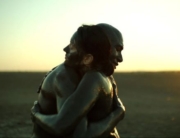Written & Directed by Dito Montiel
Produced by John Thompson, Holly Wiersma & Montiel
Released by Anchor Bay Films
USA. 90 min. Rated R
With Channing Tatum, Tracy Morgan, Katie Holmes, Ray Liotta, Juliette Binoche, Jake Cherry, Brian Gilbert & Al Pacino
Dito Montiel’s forte is the gritty dramatic thriller, with meaty New York City actors, wall-to-wall music, and a hand-held camera, and where the consequences of a troubled youth contrast with adulthood. (I’m going more so by this new film and his autobiographical debut, A Guide to Recognizing Your Saints.) It’s a shame then that his intentions get mixed up in his slightly muddled narrative and some two-dimensional caricatures, in this case of New York City cops.
Jonathan (Channing Tatum) is a rookie officer at 30 with a wife (Katie Holmes) and a young daughter, and as his odd luck would have it, his first assignment is to the 118th precinct in Queens, where his father was a heroic cop and who died in the line of duty. Jonathan also has a helluva skeleton in his closet. As a child growing up with his grandmother in an awful housing project in Queens, he killed a junkie in self-defense and a low life in an accident. The deaths were covered up by his father’s partner (Al Pacino—don’t get too excited, he’s only in a few scenes). But these bursts of violence now come back to haunt Jonathan and more: letters to a local newspaper are published about the murders and the cover-up, and he receives anonymous phone calls subsequently warning him that someone else knows about the murders. Who’s calling him? Who’s watching? Is it Jonathan’s friend Vincent (Tracy Morgan) from the projects or someone from the 118th?
Montiel also makes the story choice, and it wasn’t a necessary one, of setting this right after 9/11 in 2002. There could have been a good point made here, about life and death or honor in the NYPD, but he really doesn’t so much deal with it past some initial clips at the start of the movie, besides one or two references by Ray Liotta’s Captain Mathers character. A much more effective reference (to Amadou Diallo) comes from Mathers after an altercation with a criminal: “And they wonder why we shoot these guys 40 times.” The story could still have been set later in the 2000s, even with the ‘80s flashbacks.
While he hides the truth from his wife, Jonathan’s moral crisis works—for a while—mostly for the harrowing 1986 projects scenes. The apartment and the fluorescent lit dirty stairways are cramped and grungy, and the child actors feel like they were cast from the same neighborhood (especially Brian Gilbert and Jake Cherry as a young Vincent and Jonathan). The film comes close to being a neorealist film for several minutes.
However, I didn’t find the letters to the newspaper and the continuing cover-up totally convincing. At some point, at least one loose end would unravel over the subsequent years. Also there’s only so much time spent between Jonathan and Vincent—and in their flashbacks as boys—to understand their friendship. However, Tracy Morgan is surprisingly convincing as a mentally disturbed individual, a turn from him I would not expect in the slightest based on his previous roles.
Ultimately, there’s one other glaring problem I’ve yet to come to, and that is Tatum. I still am not sure how much this guy can act in smaller roles, much less as the lead in a film that requires some real dramatic oomph. Especially when up against a pro (Liotta) and a damn-near legend (Pacino), he’s gotta bring something else to the table. But as in other (or maybe even all?) of his performances to date, he mostly sits stone-faced, mumbles some lines, and at best gives some convincing jaw-flexes to show some agitation. Montiel also cast him in Saints in a less demanding role, and he wasn’t as bad. Here, his empty stare becomes painfully obvious and detracts from what is so powerful in the film.
Somewhere inside The Son of No One is a fantastic cop drama waiting to wiggle out. Maybe Sidney Lumet could have pulled a classic out of it. Montiel doesn’t comes close.






Leave A Comment